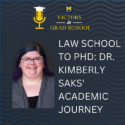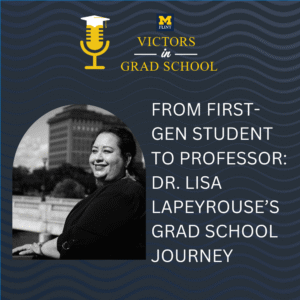
Graduate school is often seen as the next big leap in one’s educational and professional journey. Whether you’re considering law school, a PhD, or another advanced degree, the path ahead can seem both exciting and daunting. In a recent episode of the Victors in Grad School podcast, Dr. Kim Saks, a professor at the University of Michigan Flint, shared her personal experiences and invaluable advice for successfully navigating graduate school. Here’s a comprehensive summary of her insights, from making crucial decisions to leveraging opportunities for future success.
Deciding to Take the Leap
For many students, the transition from undergraduate studies to graduate school represents a significant turning point. Dr. Saks emphasized the importance of self-reflection in this process. “You have to ask yourself why you want to pursue a graduate degree,” she noted. For her, the journey began at Eastern Michigan University, where her dual interests in political science and French led her to consider both law school and a master’s in public administration.
After weighing her options and considering her passion for the legal field, Dr. Saks opted for law school. “I enjoyed reading cases and synthesizing them,” she explained. Importantly, financial considerations like scholarships also played a crucial role in her decision to attend the University of Detroit Mercy Law School.
Navigating the Graduate School Experience
Different graduate programs come with unique challenges. For Dr. Saks, transitioning from law school to a PhD program in political science was itself a learning curve. She highlighted two key strategies for managing these transitions: maintaining a strong support system and continuously honing academic skills like reading.
“Reading is like exercise,” Dr. Saks advised, emphasizing the need to keep intellectual stamina strong. Whether it’s books or long articles, maintaining a habit of reading can make the academic transition smoother.
The Importance of a Support System
One essential piece of advice that Dr. Saks offered was the importance of having a reliable support system. “Make sure you have those conversations with your support network about what to expect,” she suggested. From family responsibilities to social commitments, having understanding and supportive people around you can make a significant difference.
Moreover, regular check-ins with your support network can help everyone stay on the same page. This becomes especially important when the rigors of graduate school start taking a toll, mentally or physically.
Seizing Opportunities
Graduate school is more than just coursework; it’s a gateway to numerous opportunities that can shape your career. Dr. Saks urged students to take advantage of the various opportunities that come their way, including research projects, internships, and conferences. These experiences often serve as stepping stones for future professional success.
In particular, Dr. Saks emphasized the value of experiential learning. “Take risks, even if it’s outside traditional academic work,” she advised. Such experiences not only enrich your resume but also provide invaluable networking opportunities and practical know-how.
Conclusion: The Power of Persistence
Dr. Kim Saks’ journey through law school and her subsequent PhD is a testament to the power of persistence and the benefits of a well-thought-out plan. From understanding your motivations to leveraging available opportunities, these strategies can help any aspiring graduate student navigate their path more effectively.
Remember, the journey through graduate school is a marathon, not a sprint. Equip yourself with the right tools and support systems, seize opportunities as they come, and keep your end goals in sight. The experience is demanding, but the rewards—in terms of personal and professional growth—are well worth the effort.
For those considering further education, or already embarking on this journey, Dr. Saks’ advice provides a valuable roadmap. Take it to heart, and you’ll not only survive but thrive in your graduate school experience.
TRANSCRIPT
Dr. Christopher Lewis [00:00:01]:
Welcome to the victors in grad school, where we have conversations with students, alumni, and experts about what it takes to find success in graduate school.
Dr. Christopher Lewis [00:00:11]:
Welcome back to victors in grad school. I’m your host, doctor Christopher Lewis, director of graduate programs at the University of Michigan, Flint. I’m really excited to have you back again this week. As always, every week, you and I are on a journey together. This podcast allows for you an opportunity to be able to look under the surface, to be able to learn from other people, and to be able to learn more about what it takes to find success in graduate school. This is definitely a journey. You may just be at the very beginning where you’re just starting to think about graduate school. You might be post application where you’re waiting on that application decision, or maybe you got your decision already, and now you know where you’ve been admitted to and you’re making that decision of where to go.
Dr. Christopher Lewis [00:00:58]:
No matter where you are, this show is here to be able to help you to be able to find success and find success sooner as you go through this journey for yourself. That’s why every week I love being able to bring you different people, different guests with different experiences that can walk you through what they learned along the way to help you to be able to maybe miss some of those stumbling blocks that they might have hit, but also to add some add some tools to your own toolbox that’ll make it even easier for you as you go through this as well. This week, we got another great guest with us. Dr. Kimberly Sachs is with us today, and doctor Sachs is a professor at the University of Michigan Flint. She’s the program director for our master’s in public administration program, but also works in political science. And I’m really excited to be able to talk to her about her own experience and for her to share some of that journey with you. Doctor Sachs, thanks so much for being here with us today.
Dr. Kim Saks [00:02:03]:
Thank you for having me. I’m pretty excited about this. I appreciate it.
Dr. Christopher Lewis [00:02:07]:
Well, I’m really excited to have you here as well. Well, one of the first things that I always love doing is I love turning the clock back in time. And I know that you did your undergraduate work at Eastern Michigan University. And as you were going through that educational journey for yourself and getting that bachelor’s degree in political science and French, at some point, you made a decision. You made a decision to go to law school. And I would love to go back to that point. And I wanna kind of hear what you were thinking in your head to be able to say to yourself, I wanna take that next step. Why did you decide you wanted to take that job and go to law school?
Dr. Kim Saks [00:02:49]:
So at that point in time, I kind of had 2 paths in mind. 1 was, obviously, to go to law school. The other was to go and actually get a master’s public administration degree, which is kind of ironic that I direct that program now, because I knew I wanted to work in public service in some capacity. I just didn’t quite know which direction I wanted to go, whether it was in the legal sector or whether it was more of an administrative type role. Ultimately, because of some coursework I had towards the end of my degree, I really felt like the legal field was right for me, And I really enjoyed reading cases, synthesizing them, and it felt it just felt like the right path for me based on some coursework and some discussions with faculty that I had. And I even had looked into joint MPA JD degrees at the time, but figured I kinda wanted to focus on the law degree and not get too turned in different directions. So I always had contemplated that there might be further education after that, but never, never kind of anticipated the path that I ended up taking. So that was the decision.
Dr. Kim Saks [00:04:00]:
And then I, I took the LSAT knowing that that dual path was still open to me and did well enough and had a good enough GPA that I had opportunities to go to law school. I had a scholarship to go to University of Detroit Mercy, and so I took advantage of that and and went there.
Dr. Christopher Lewis [00:04:17]:
Well, that was gonna be my next question, and and maybe it was the scholarship alone. But every person goes through a process of being able to identify where that next step is. You chose to go to the University of Detroit Mercy Law School. And talk to me about that decision process for yourself and what were some of the things that you were primarily looking for, and what would the what the ultimate decision making was that led you to decide to study at the University of Detroit Mercy?
Dr. Kim Saks [00:04:46]:
So the scholarship helped, but it wasn’t the only thing. Because UDM is a private school, so the tuition is higher. So a scholarship will help make it more affordable, but, already, you’re starting with a higher ticket price at at that point. So I did have to weigh my options, although the scholarship helped quite a bit. But one of the things that I was very, very adamant about was that the school that I picked had to be keenly invested in public service. And University of Detroit Mercy is a Jesuit school, and the Jesuit tradition is very much invested in public service. And the public sector law, they have a variety of clinics that are open to the public, and I was able to take advantage of a fellowship to work at a nonprofit over the summer where I would not have normally gotten paid, and I personally would not have been able to take that hit to do an unpaid internship, but they had a program where they paid people to go do these, I guess, it’s externship at that point. And I got paid for it despite the the nonprofit not being able to pay me, but they worked out these fellowships, that they fundraise for, and this was really part of their ethos.
Dr. Kim Saks [00:05:59]:
So a big part of what drew me was that they focused on these opportunities that were really grounded in public service. And so that for me was kind of a turning point in my decision making.
Dr. Christopher Lewis [00:06:11]:
Now you went to law school, you finished law school, and you also decided after working for a number of years to continue your education, and not everybody will do that. I I’ve worked with a number of students that go through law school and know what they go through in law school to know that for some students, that’s enough. But for you, you made a decision that you wanted to continue on into a PhD program in political science. Talk to me about that. What made you decide that it was time to go back to school after working for a number of years with your law degree?
Dr. Kim Saks [00:06:51]:
So I think my mother lives in perpetual fear that I’m gonna go back to school again even now. Another room, another degree, but I don’t I don’t plan on it anytime soon. But I practice for a while, and I love the law. I really do. I I teach classes on the law. My legal education is very much being used in what I do on a day to day basis. I practice for a while in a private firm. I did not like the act of billing my time.
Dr. Kim Saks [00:07:17]:
That is not something that I am very good at. It’s not necessarily time management. It’s literally keeping track of what I’ve done. It just didn’t suit me very well. So I went to work in house at Wayne State in their Office of Equal Opportunity, and I went from a very high pressure environment to a fairly, for me, low pressure environment. And I started getting a little antsy. And I knew that I had always wanted to teach, and I thought that would just be down the road, like, as a kind of one off adjunct experience. But I said, you know, I’m here now.
Dr. Kim Saks [00:07:52]:
I can take classes for free up to a certain level per semester or per year. Why don’t I test this out and see how it goes? And if I end up stopping out at a master’s, so be it. You know? So I started doing it, and I absolutely loved it. And because I had the JD at the time, I was still able to adjunct elsewhere because that’s a terminal degree, and so I could be hired out elsewhere and teach. And I absolutely fell in love with teaching. And I knew at that point that this was the path that I wanted to go down. I also subsequently fell in love with research too, and really love the idea of being able to explore questions using data and using experiments and things of that nature in ways that you don’t get to do until you’re at that level and being able to direct your own research. And so I really enjoyed it.
Dr. Kim Saks [00:08:47]:
And and one of my favorite things about what I do now is trying to bring those experiences to my students, whether they’re master students or undergraduate students, to get them involved in that process so that they understand what research is like and what each step of the process might look like.
Dr. Christopher Lewis [00:09:04]:
Now in every transition that you go through, whether it be from undergraduate to law school or undergraduate to another type of graduate degree, whatever it may be, there are transitions that you go through. And from one level of education to the next level of education is very different than one another. Going from bachelor’s to law school is a completely different type of learning. Going from law school to a PhD, Different type of learning. And there’s different expectations from your faculty, and there’s different expectations from what you are hoping to take out of those experiences and that and the end goals as well. Now you were successful in going through law school, getting your doctorate degree, continuing on. As you think back to those transitions that you went through, what did you have to do to set yourself up for success? And what did you have to do to maintain that success throughout your graduate school experiences?
Dr. Kim Saks [00:10:03]:
So the first thing I will say is make sure you have a support system around you. The same could be said of life in general, but when you’re going to take on these new endeavors, make sure others are on board with what they’re gonna need to do to support you. And that just means having a conversation about what things are gonna look like moving forward. Because whether it’s friends or family, you might not be able to do certain things that you were able to do before as frequently, or you might need their help in something. Especially if you have kids or other responsibilities, you might need people to step in. And so having those conversations and revisiting those conversations, not just thinking you can have them, you know, a week before school starts and then that’s it, you’re good for the rest of your time in whatever program you’re in, kind of making it a point to check-in on those conversations is really good. I will also say every transition I have ever made like this, a big transition, I have always had that moment of, I jump in and I get ready, and then I’m like, oh my god. What did I just do? What did I just get myself in to? I have a little bit of a freak out moment.
Dr. Kim Saks [00:11:09]:
And I tell all of my MPA students, this especially, because they’re gonna have a moment when they’re like, what did I get myself into? And I tell them, I’ll come find me because we’ll walk through it together. We’ll sit through it. We’ll figure out, you know, if there’s a real issue or if you’re just kind of having a culture shock because a lot of times, that’s what it is. It’s a culture shock. I distinctly remember having one when I started law school. I had one during my law school orientation, and then I had one when I went to grad school. And I remember, my first class, all of a sudden, everybody seemed to understand the statistics right away that were in this one article. And I thought, oh my god.
Dr. Kim Saks [00:11:45]:
Am I going to have to know this right off the bat? Because I don’t. And I just was like, I must be the dumbest person in this room. And, of course, I wasn’t. It was just I hadn’t taken the same classes that these other people had taken yet, but I had to put that into perspective. And sometimes you need to have those perspective moments where you’re like, okay. It’s just me kind of getting my grounding. I need to take a breath. I need to really see my way through this because most of the time, it’s just the culture shock of getting into a new thing.
Dr. Kim Saks [00:12:15]:
And with my students, a lot of times, we’ll sit down in that 1st semester, in that 1st year, and by the time they’ve graduated, they’re like, I you told me I was gonna have that moment. I had it. I got over it. And then I went on and it became like secondhand to me, and it was smooth sailing from there out. And most of the time, it’s that culture shock moment where you’re like, how am I going to do all of this? I hate the metaphor so much, but it is like learning to ride a bike because you do learn to put it and fit it into your life in a different way. Your life will change just the way you live your life, your daily mechanics of things, because you have to fit things in in a different way. And that’s gonna look different from your undergrad to your grad, or for me, even from law school to grad school, when I fit in my reading and my writing time was completely different, especially once I had kids in grad school. So, you know, having to figure out those quiet times was completely different post kids.
Dr. Kim Saks [00:13:11]:
So you have to kind of figure out how it fits into your life, and then you’ll kind of calm down a bit and focus on the work and not so much how it works in your life.
Dr. Christopher Lewis [00:13:20]:
You know, those are great points because I think you’re completely right. You do change as you go through graduate school. And I love the point that you made in regard to checking back in with your support system because many times, your support system has no clue what you’re going through, and they don’t know how to support you. So if you don’t reach out to them and let them know what you’re going through and let them know what kind of support that you need, they’re not going to be able to give it to you. So it is so important, as doctor Sacks just said, to have conversations upfront about what you anticipate, but also let people understand the reality of the situation once you get into your graduate program and you start to see what that reality is, whether it’s hitting that wall right at the law school orientation where you’re looking at stats, and you’re saying, I have no clue what I’m getting myself into, versus getting into those first couple classes where you might be called on, and you’re having to stand up, and and you’re having to be an expert in your own right about what you’ve just read. Unless the people around you, the support people, have gone through the same type of degree, they’re not going to understand it. And even if they went through it, it’s not the same situation. It may not be the same school, and it’s definitely probably not the same professors.
Dr. Christopher Lewis [00:14:48]:
So that meaning being said, keep the conversation going. Don’t ice people out. Let people back in. Let people know what you’re going through. They’re going to appreciate it, and you’re gonna appreciate it in the end. Doctor. Sacks, as you mentioned, you’re a professor now at the University of Michigan Flint, and you work with students not only in the master of public administration program, but you’re working with undergraduate students too. And I guess as you look back at your own experiences, but also as you’re working with graduate students or students that are looking at possibly going to graduate school in the future, what are some tips that you might offer to other individuals that are thinking about graduate school, whether it be for law school or a PhD or something completely different that could help them find success sooner?
Dr. Kim Saks [00:15:36]:
So one of the things I will say is keep reading because reading really is like exercise. If you stop doing it at any point in time, it’s gonna be harder to build back up. And no matter what graduate program you go into, it does not matter. You’re going to be reading a lot. And so if you’re trying to go from 0 to a100 your 1st day of classes or your 1st week of classes, that’s gonna be really hard. So I don’t care what you read. It should be books or long form articles or those types of things, but read. Keep that stamina up for reading and really make sure that you’re not putting yourself in a position where you’re both having to adjust to a new program and adjust to back to that skill at the same time.
Dr. Kim Saks [00:16:19]:
But also kind of understand what it is you wanna get out of a degree. I also am the pre law adviser for the University of Michigan Flint, and a lot of times students come to me and say, I wanna go to law school. And when I ask why, which is always my my second question, they don’t have the answer for it. They’ve either been told they should, or they’ve been given answers they see on the media. But you really need to ask your why early and often because it may change. But think about the why and what you expect to get out of it and keep that really burning bright in the background while you’re doing the work for a couple of reasons. One is when things are tough, you’re gonna look at that and be like, okay. That’s the goal.
Dr. Kim Saks [00:17:01]:
But the other thing that will help you do is not miss out on opportunities along the way. You know, whether your program’s entirely online or whether it’s in person or a mix of both, there are going to be opportunities that come your way that are outside of the traditional class experience, and you should take advantage of those. One of the things that I find students often regretting is not doing something. Right? Not doing this or not doing that or not taking advantage of this. I think that students who find themselves taking advantage of some of the opportunities that they have, whether it’s at the undergraduate or graduate level, find their experiences much more meaningful, and also find their degree to feel more valuable in that sense. So in our program, we have a lot of people who will end up doing independent studies so that they can work on projects with a nonprofit or another organization that are kind of focused projects that are kind of part academic, part practical. And students who do that type of thing, it might be different. It’s kind of out of the norm.
Dr. Kim Saks [00:18:08]:
And so it’s, it’s taking a little bit of risk, But quite often, those are the things that change a career trajectory. Right? Those are the things that give you experience, create a portfolio piece, and give you a lot of networking. And so it’s risk, but it’s also a lot of reward. And even if nothing concretely comes out of it, like a job offer or something, you have this experience now that when you’re on a job interview for the next thing coming down the pipe, you now can say, I’ve done x, y, or z, and here’s the proof of that. Here’s what I’ve done. Here’s what I experienced. Here are the challenges I faced. Here are the resource constraints, and that’s invaluable to have.
Dr. Kim Saks [00:18:49]:
So take advantage of those things. Go to conferences. There’s a lot of conferences on any campus that are available to students. Usually, they’re they’re low cost or free if you can participate in that. I know we have a research conference here on campus every year. So put something together for the research conference, put it on a poster, or do a presentation. It is a great experience to have. It’s really something good to have on your resume, but it’s also just the experience of doing it is something really important to have kind of in your in your tool belt as you move forward in your career.
Dr. Kim Saks [00:19:23]:
No matter what it is, you’re always going to have to be presenting. You’re always going to have to be reading, and you’re always gonna have to be writing at some level. And so working on those skills, honing those skills in different capacities is going to be important as well.
Dr. Christopher Lewis [00:19:38]:
You know, I always tell graduate students that as you go through this graduate school experience, you’re only there for a limited amount of time. It may seem like it is a huge amount of time as you’re stepping into that first class. But by the end, you’re gonna look back and say, where did it go? It went by so fast. And the most important thing that I tend to tell every graduate student is, say yes more than you say no. Take advantage of the opportunities that are presented to you. Don’t wait and say, I’ll wait for the next one. Because the next one might not come. So if you have a professor like Doctor.
Dr. Christopher Lewis [00:20:22]:
Sacks, that’s offering you an opportunity to do research, or someone that comes to you and says, I have an opportunity for you to volunteer or to do an internship or to get this type of experience, Take advantage of that because all of those things that you’re going to be doing along the way are going to build upon each other and are going to give you the skills, the knowledge, and more that are gonna help you to be the professional that you want to become in the future. Well, doctor Sacks, I just wanna say thank you. Thank you so much for sharing your journey today, for being here, and for working with all of our undergraduate and graduate students here at the University of Michigan Flint as they are working to create the next step for themselves. And I truly wish you all the best.
Dr. Kim Saks [00:21:07]:
Thank you for helping me. I appreciate it.
Dr. Christopher Lewis [00:21:09]:
The University of Michigan Flint has a full array of master’s and doctorate programs if you are interested in continuing your education. Whether you’re looking for in person or online learning options, the University of Michigan Flint has programs that will meet your needs. For more information on any of our graduate programs, visit umflint.edu/graduateprograms to find out more. Thanks again for spending time with me as you prepare to be a victor in grad school. I look forward to speaking with you again soon as we embark together on your graduate school journey. If you have any questions or want to reach out, email me at flintgradoffice@umflint.edu.





